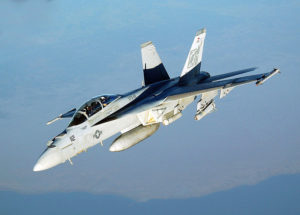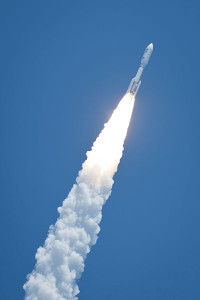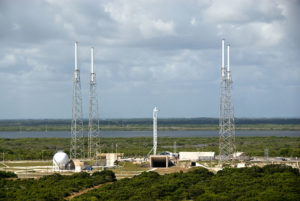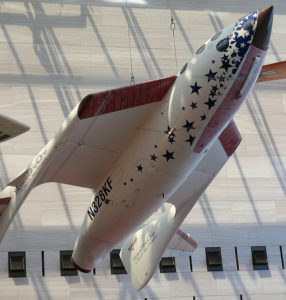 NASA’s research to advance supersonic flight will produce loud booms along Canaveral National Seashore on Space Coast. Residents near the area around Kennedy and Cape Canaveral Air Force Station could hear more than 30 booms during flights next month, NASA officials said Monday.
NASA’s research to advance supersonic flight will produce loud booms along Canaveral National Seashore on Space Coast. Residents near the area around Kennedy and Cape Canaveral Air Force Station could hear more than 30 booms during flights next month, NASA officials said Monday.
Researchers from Langley Research Center in Virginia and Armstrong Flight Research Center, NASA’s primary center for atmospheric flight research and operations, are planning to conduct a series of tests. The two-week investigation is starting in August at Kennedy Space Center. The tests are part of the Sonic Booms in Atmospheric Turbulence flights, called SonicBAT. They will help researchers understand how atmospheric turbulence affects the sonic booms residents hear when aircraft fly faster than the speed of sound. Continue reading “NASA Tests to Rumble Space Coast in August”
SpaceX Launches Once-Used Cargo Spacecraft
 The company is making history again- for the first time, SpaceX reuses one of its Dragon cargo capsules.
The company is making history again- for the first time, SpaceX reuses one of its Dragon cargo capsules.
This evening, SpaceX is launching another one of its Falcon 9 rockets. It is the 100th launch from Launch Pad 39A at Kennedy Space Center, Florida and the spacecraft is sending cargo and supplies to the International Space Station for NASA.
However, this will be the first time that SpaceX will send a once-used cargo spacecraft. The Dragon cargo capsule launching tonight was first used to deliver supplies to the International Space Station in 2014. The Dragon stayed about a month at the station then landed with the help of parachutes in the Pacific Ocean. Afterward, it was inspected and refurbished by Space X. A few components have been swapped out, mostly those that came in contact with sea water when the spacecraft splashed down into the ocean. Moreover, a new heat shield was added.
Continue reading “SpaceX Launches Once-Used Cargo Spacecraft”
SpaceX Makes History by Successfully Re-launching First Orbital Rocket
 SpaceX launched the first reusable orbital rocket into space and then landed it on Earth Thursday.
SpaceX launched the first reusable orbital rocket into space and then landed it on Earth Thursday.
In another historic first, SpaceX successfully re-launched one of its Falcon 9 reusable rockets into space and then landed the 224-foot-tall booster on a barge in the Atlantic Ocean safely.
The milestone occurred on March 30 and marked the first time in the spaceflight history that the same rocket has been used on two separate missions to orbit.
The Falcon 9 successfully launched a satellite toward orbit, 22,000 miles into space, delivered a telecom satellite to a Geostationary Transfer Orbit Continue reading “SpaceX Makes History by Successfully Re-launching First Orbital Rocket”
SpaceX Stops Rocket Launch at the Last Minute
SpaceX delayed a rocket launch from Nasa’s historic moon pad 13 seconds before liftoff due to a familiar glitch.
Last-minute rocket trouble forced SpaceX to halt the countdown with just 13 seconds remaining.
The launch of the unmanned Falcon 9 rocket was originally scheduled for Saturday at 10:01 a.m. ET. The new window for the mission will open at 9:38 a.m. Sunday. The company and NASA have officially announced the delay on Twitter. Continue reading “SpaceX Stops Rocket Launch at the Last Minute”
Space X Says September Rocket Explosion Caused by Helium Loading Issue
 After finishing its investigation, Space X says the September 1 explosion of its Falcon 9 rocket occurred due to the failure of a helium storage tank. Space X is now targeting January 8 for its return to flight.
After finishing its investigation, Space X says the September 1 explosion of its Falcon 9 rocket occurred due to the failure of a helium storage tank. Space X is now targeting January 8 for its return to flight.
Read more on the topic here.
The Kennedy Space Center May Soon Be Underwater
 NASA’s Kennedy Space Center could soon be under water due to global warming.
NASA’s Kennedy Space Center could soon be under water due to global warming.
Sea levels are rising and the multi-billion dollar complex is already seeing the effects of climate change. It appears, the land under the center is slowly sinking into the ocean. The Space Center in Florida may have to abandon some of its launchpads and facilities within a decade.
NASA partnering with the U.S. Geological Survey has been doing research on erosion happening along a 6-mile stretch of beach between the iconic launch pads 39A and 39B which have been used for the Apollo missions to the moon and many space shuttle flights.
The majority of NASA’s facilities are located at the edge of the sea for logistical reasons. If failures happened, they would be less dangerous to the public when launching rockets or testing spacecrafts over water. Continue reading “The Kennedy Space Center May Soon Be Underwater”
Explosion Rocks SpaceX Launch Pad
 A Space X Falcon 9 rocket exploded at Cape Canaveral
A Space X Falcon 9 rocket exploded at Cape Canaveral
An explosion at Space X launch site has rocked Cape Canaveral on Thursday morning. The incident took place just after 9 a.m. at Launch Complex 40 while an unmanned Falcon 9 rocket was being test-fired ahead of a scheduled launch at 3 a.m. on Saturday, said NASA. Continue reading “Explosion Rocks SpaceX Launch Pad”
SpaceX to Launch Facebook’s Internet Satellite This Week
 Facebook’s first satellite, which would beam Internet service from space is scheduled to blast into orbit from Cape Canaveral September 3.
Facebook’s first satellite, which would beam Internet service from space is scheduled to blast into orbit from Cape Canaveral September 3.
Facebook’s first satellite which aims to beam Internet service from Space to rural parts of sub-Saharan Africa is scheduled to blast off September 3 aboard a Falcon 9 rocket. The spacecraft will be launched by Space X, Elon Musk’s space launch company. Continue reading “SpaceX to Launch Facebook’s Internet Satellite This Week”
SpaceX Planning Rocket Storage at Port Canaveral
 SpaceX plans to store and refurbish rockets at Port Canaveral.
SpaceX plans to store and refurbish rockets at Port Canaveral.
SpaceX is planning to lease a building at Port Canaveral and may build another facility.
SpaceX’s Falcon 9 rocket made its way through Cape Canaveral on June 6 from Port Canaveral and it was the fourth reusable rocket that was brought back to the Cape and is moving into storage now. The private space flight company has successfully recovered a launched rocket three times on an ocean barge floting in the Atlantic Ocean Continue reading “SpaceX Planning Rocket Storage at Port Canaveral”
Second Falcon 9 Rocket Ground Lands Successfully
 SpaceX has successfully landed another unmanned Falcon 9 rocket after launching it into space early on Monday from Cape Canaveral, Florida.
SpaceX has successfully landed another unmanned Falcon 9 rocket after launching it into space early on Monday from Cape Canaveral, Florida.
The 23-story-tall Falcon 9 rocket is built and flown by SpaceX, Elon Musk’s Space Exploration Technologies. Falcon 9 rocket blasted off from Cape Canaveral Air Force Station at 12:45 a.m. EDT. and shortly after take-off, the vehicle touched down at the launch site, SpaceX’s Landing Complex 1. Continue reading “Second Falcon 9 Rocket Ground Lands Successfully”